|
|
|
|
|
| |
Established Seedlings of
Phalaenopsis bastianii 'BAS2' × 'BAS1' |
|
| |
|
|
| |
| Number: |
TN8599 |
| Name: |
Phalaenopsis bastianii 'BAS2' × 'BAS1'
|
| Type: |
outcross (What's that?) |
|
Click to Enlarge

Pod Parent Flowers |
Click to Enlarge

Pollen Parent Flower |
|
|
|
| |
For additional origin/habitat information supplied courtesy of
Charles and Margaret Baker, see further below, near the bottom of this page.
|
Temperatures we attempt to use in the lab & greenhouse:
| For Species: |
|
Spring, Summer, Autumn, Winter: days average 82°F, nights 67°F; best fit is Warm-Intermediate 87-64°F
(Source:
Baker's Web OSC) |
| For Genus: |
|
Spring, Summer, Autumn, Winter: days average 87°F, nights 64°F; best fit is Warm-Intermediate 87-64°F
(
) |
|
About the name...
| Etymology of |
Phalaenopsis |
|
From Greek, "phalaina" moth; "-opsis" appearance.
(Source:
Pridgeon 1992) |
| Pronunciation of |
Phalaenopsis |
|
fail-eh-NOP-sis
(Source:
Pridgeon 1992) |
| Pronunciation of |
Phalaenopsis |
|
fal-eye-NOP-sis
(Source:
Hawkes 1978) |
|
If you would like to direct someone to this web page, please copy and paste this URL into your email:
http://troymeyers.com/d?128599
|
ESTABLISHED SEEDLINGS
of these are not currently available, but we have some maturing in the greenhouse and expect to offer them in the future.
There are 16 items with
1 plant per
item that will be considered for sale later.
Click here to see if we have flasks available.
|
|
|
| |
The origin/habitat information below is supplied courtesy of Charles and Margaret Baker
The following information is based on the name of the plant provided by the donor, and assumes that the name is correct. If the plant has been misidentified, then the following information may not be correct.
This text is copyrighted by the Bakers and may not be reproduced without permission.
ORIGIN/HABITAT: Philippine Islands. This orchid has been described as
occurring in the Sulu Archipelago, but details of habitat location and
elevation were not reported. Christenson (1998), however, reported that
these plants require intermediate to warm temperatures and regular
watering throughout the year with medium to medium-bright light levels.
Therefore, we have selected climate data accordingly, but the climate
table and resulting cultural suggestions should be used somewhat
cautiously until more precise habitat details are available.
More about this information and the Bakers...
|
|
|
| |
|
|
|